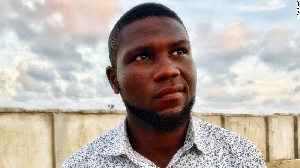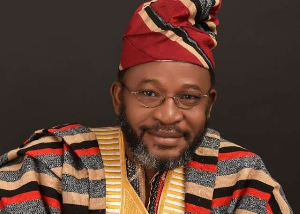Last year Ifeanyi Ugokwe was arrested and locked up for weeks. His crime: he tried to take his own life.
After weeks of being hungry and jobless, the 25-year-old says he reached breaking point after a security guard pushed him to the ground while he was searching for work at a building site.
"I was tired of walking around that day. And I was determined to work there... so I tried to force my way in, then he pushed me, and I fell down flat on the floor," Ugokwe told CNN.
"I started begging him because I was tired, I really needed that job because I needed to eat."
Humiliated, Ugokwe went to a nearby lagoon and jumped in.
After being rescued by passing fishermen, Ugokwe says he was handed over to police officers who arrested him and put him in jail.
Attempting suicide is a criminal offense in Nigeria, under Section 327 of the Criminal Code Act, and carries a penalty of up to one year in prison. A holdover from when Nigeria was a British colony, the law was abolished in Britain under the Suicide Act of 1961, which happened after Nigeria gained its independence in 1960.
Ugokwe says he's speaking out about his attempt to take his own life despite stigma around the subject in Nigeria because he doesn't want people to suffer as he did.
When he woke up on the fisherman's boat, Ugokwe says he was angry that his attempt had failed.
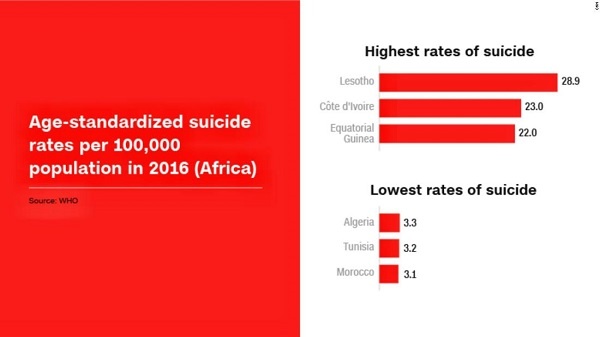
Following his arrest, Ugokwe was held at a cell near the Lagos lagoon, in the country's economic capital, before being transferred one week later to another cell on the Lagos mainland.
Ugokwe says he was unaware that attempted suicide was a crime in Nigeria.
"When they put me in the cell, the first thing that came to my mind was what did I do? I didn't kill anybody. I did not steal. What am I doing here? What did I do wrong? It's my life, not (the) government's life," he said.
Shortly after his arrest in February, Ugokwe appeared before a magistrate to determine whether he had committed an offense. His case was postponed and he was transferred to another facility on Lagos Island.
It was there he met Imanuella Ojeah, a criminal lawyer and a member of the Elevation Church in Lagos, whose volunteer prison unit makes weekly trips to local prisons.
"I remember he seemed tired of life. He begged me to get him out of that place. He told me... I am not mad. I am just depressed and don't have money to eat," Ojeah told CNN.
Ojeah and her team represented Ugokwe at his next court appearance at Sabo Magistrates Court, a few weeks later, in April 2017. They were asked if someone was willing to act as a guarantor for Ugokwe and look after his welfare if he were released.
Ojeah found someone from the Elevation Church who agreed to look after Ugokwe and the magistrate dismissed the case.
Although Ugokwe found freedom, the legal process around these types of cases is lengthy and complicated for people suffering from serious mental health issues, says health law expert Cheluchi Onyemelukwe who is campaigning to abolish the suicide law in the country.
"What happens in the legal process is the police arrest you, put you in a cell, and then charge the matter to court and you are arraigned before a magistrate who determines whether it appears an offense has been committed," she says.
As in Ugokwe's case, the survivor is then remanded to jail to wait for a trial date. If found guilty, they may be imprisoned for a maximum of one year.
Although jail terms for suicide survivors are rare, Onyemelukwe says it is the process of arresting and taking them through a legal process that is particularly cruel.
Death rate for suicide per 100,000 people in Africa in 2016
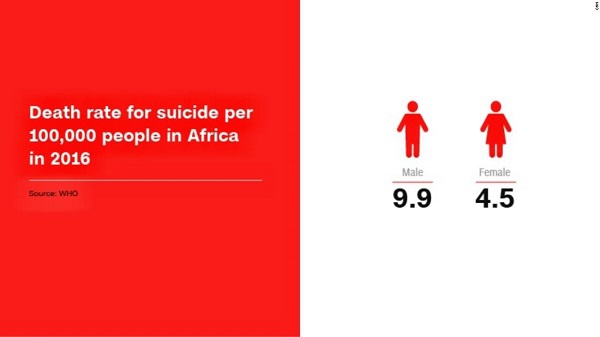
"I believe it doesn't reflect who we are as Nigerians... it is inhumane and I know that we can do better than that. I think it is probably the worst possible thing that you could do to somebody who finds themselves in that sort of situation," she said.
"People who are thrown into a cell right after... wonder why the suicide wasn't successful. It makes people that I have spoken to feel helpless and feel like there really isn't a reason to go on."
Ugokwe says he contemplated suicide again while in jail because of the conditions he was held in.
"The worst part of it was not just that they put me in prison, it was that they locked me in a cell with crazy people. I was with mentally disturbed people. Most of the people there were talking to themselves and jumping around."
In jail, Ugokwe says he and other inmates were forced to take pills.
"At first, when they brought the pills to me, I refused... there was nothing wrong with me, but then I was beaten and forced to take the pills.
"Those pills had terrible effects on me... all I want to do is sleep and eat."
A spokesman for the Lagos division of the Nigerian Prisons Service, which operates prisons in the country, denied Ugokwe's allegations.
"Allegations and incidents of force-feeding, beating and or forceful admission of medication on inmates are false and do not occur in any prison within the Lagos Command," Rotimi Oladokun told CNN in an emailed statement.
"The Controller of Prisons, Lagos Command has no tolerance for such excesses and will not condone such under his command," he added.
The Lagos State Attorney General and Commissioner for Justice, Adeniji Kazeem told CNN that although attempted suicide is criminalized in the country, the state does not recommend that anyone should be locked up.
Suicide rates are usually underreported in Nigeria because of the stigma associated with it. However, the World Health Organization estimates that there are 9.5 suicides per every 100,000 people in the country.
African countries where suicide is illegal
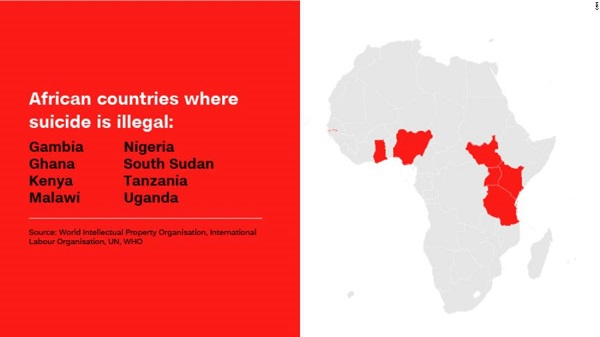
Some common causes are depression and anxiety linked to high levels of poverty.
A 2017 WHO report found that Nigerians have the highest incidences of depression in Africa, with around 7,079,815 suffering from depression, a figure that represents 3.9% of the population.
In 2015, Lagos State amended its law to recommend hospital treatment for those who have attempted suicide.
But the law has yet to be changed at a national level and is not currently being considered for review, according to health law expert Onyemelukwe.
"We are guided by what the law says," Kazeem says. "But in the hierarchy of offenses, this is a simple offense, and the recommended action is hospitalization.
"The law does not say anyone should be incarcerated. Attempted suicide is not a crime. It shows some form of disorder which needs medical attention."
Kazeem added: "My office has not prosecuted anyone. The state government does not prosecute attempted suicide victims. We are not aware of any prosecutions, if it was brought to my attention, we would advise against it."
Kazeem said police officers do have prosecutorial powers in Lagos State and he could not speak to whether such a trial went ahead in Ugokwe's case.
However, Kazeem acknowledged that more training was needed for police officers.
"We are going to do that education process. They are doing the wrong thing if they lock up victims," he said.
CNN made several requests for a comment from the Lagos State Police Commissioner but did not receive one.
There are frequent reports in local media of survivors being arrested and tried for attempting suicide.
In July this year, a 27-year-old man was charged in court with attempting suicide in June.
Other African countries like Ghana, Kenya, Tanzania, Uganda, Malawi, Gambia, and South Sudan also outlaw suicide.
Onyemelukwe says the suicide law, a legacy of the colonial era, has no place in Nigeria today.
"I want Nigerians to see real people who have attempted suicide and have survived and realize that these are people who could be our friends, our brothers, our sisters, our mothers, our fathers.
"Attempted suicide in itself is a risk factor for contemplating suicide. In fact, it is the predictor of the fact that somebody will commit suicide. We are in a place where all of these laws deserve a second, a third, a fourth look until we change it," she added.
She believes police need to be given the power to refer survivors for treatment rather than arrested and put through the legal system.
"The person doesn't have to spend any time in prison," she says.
Life has started to get better for Ugokwe in recent months. He's found friends he can call on when he's feeling sad but he's still trying to get back on his feet.
Thinking back on his time in jail, Ugokwe says he wouldn't want anyone to go through what he experienced.
"No one deserves that," he said.
"At that time, I needed love. I didn't need to be put in prison and punished for something I don't even understand."
General News of Sunday, 30 December 2018
Source: edition.cnn.com

